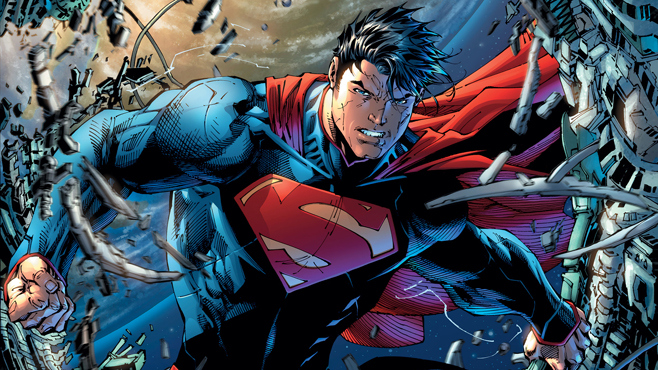 Here goes my Superman character analysis. Although he is arguably the most well-known and famous superhero, he is definitely not the most loved, or understood. Many people view him as boring and uninteresting, and find characters like Batman and Spider-Man to be far more intriguing and complex. Superman is the guy that just punches things right? Wrong. There is a lot more to the character of Superman than you may think, so today I want to get a little deep and get into a Superman character analysis.
Here goes my Superman character analysis. Although he is arguably the most well-known and famous superhero, he is definitely not the most loved, or understood. Many people view him as boring and uninteresting, and find characters like Batman and Spider-Man to be far more intriguing and complex. Superman is the guy that just punches things right? Wrong. There is a lot more to the character of Superman than you may think, so today I want to get a little deep and get into a Superman character analysis.
Superman is my favourite superhero. When I tell some people that, they ask why? Isn’t he boring? That’s why I wanted to write this Superman character analysis, to just get out how I personally view him.
Just like any analysis, my analysis of Superman is purely subjective, and you may or may not disagree with what I’m going to say, and you know what that’s perfectly okay! So bear with me, this may turn out to be a really long post, but when you’re passionate about something, you can’t help but talk about it for a very long time.
First of all I want to give you my answer on the age old question of what is Superman’s real identity? Let’s look at this quote from Kill Bill:
Superman didn’t become Superman. Superman was born Superman. When Superman wakes up in the morning, he’s Superman. His alter ego is Clark Kent. His outfit with the big red “S”, that’s the blanket he was wrapped in as a baby when the Kents found him. Those are his clothes. What Kent wears- the glasses, the business suit- that’s the costume. That’s the costume Superman wears to blend in with us. Clark Kent is how Superman views us. And what are the characteristics of Clark Kent? He’s weak, he’s unsure of himself, he’s a coward. Clark Kent is Superman’s critique on the whole human race.
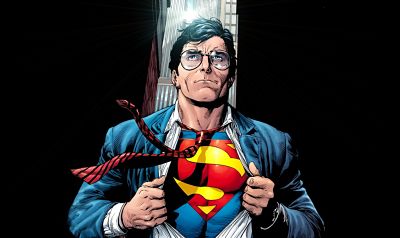 So if you have read Superman over the years then you know there are two very different characterisations of Superman. You have your Superman who uses Clark Kent as his secret fake identity, with Superman being his real identity. This can be seen in many of the older Superman comics, where Clark Kent is a bumbling fool. This is what the Kill Bill quote is describing, this Superman that apparently uses the Clark Kent persona to demonstrate how Superman views humans. Personally I think that’s complete bullshit. Superman loves humanity and doesn’t seek to emphasise the flaws in humanity, but rather seeks to emphasise the strengths in humanity. This is why the current Superman characterisation makes much more sense in my eyes. Superman at the end of the day didn’t grow up on an alien planet, he grew up on Earth, as a human. He grew up as Clark Kent. He is Clark Kent. In the current characterisation of Superman, Clark Kent may be his secret identity, but it is also who he is. Superman is also who he is. There is no ‘fake’ identity, they are both aspects of who he is. Why would someone who grew up as Clark Kent, with values and ideals instilled on to him as Clark Kent, use Clark Kent as a fake persona? Never made sense in my eyes, which was why the old Clark Kent characterisation never really resonated with me. It was only until they stopped pursuing this idea of Clark Kent supposedly being the ‘fake’ identity that I was able to actually care about this character more.
So if you have read Superman over the years then you know there are two very different characterisations of Superman. You have your Superman who uses Clark Kent as his secret fake identity, with Superman being his real identity. This can be seen in many of the older Superman comics, where Clark Kent is a bumbling fool. This is what the Kill Bill quote is describing, this Superman that apparently uses the Clark Kent persona to demonstrate how Superman views humans. Personally I think that’s complete bullshit. Superman loves humanity and doesn’t seek to emphasise the flaws in humanity, but rather seeks to emphasise the strengths in humanity. This is why the current Superman characterisation makes much more sense in my eyes. Superman at the end of the day didn’t grow up on an alien planet, he grew up on Earth, as a human. He grew up as Clark Kent. He is Clark Kent. In the current characterisation of Superman, Clark Kent may be his secret identity, but it is also who he is. Superman is also who he is. There is no ‘fake’ identity, they are both aspects of who he is. Why would someone who grew up as Clark Kent, with values and ideals instilled on to him as Clark Kent, use Clark Kent as a fake persona? Never made sense in my eyes, which was why the old Clark Kent characterisation never really resonated with me. It was only until they stopped pursuing this idea of Clark Kent supposedly being the ‘fake’ identity that I was able to actually care about this character more.
Okay now that we have that out of the way let’s move further into this Superman character analysis. Many people think that Superman’s character is too perfect. He works alongside a moral absolute and does everything right all the time, and that’s pretty much his character. But in reality that isn’t quite the case. A big aspect of his character, which I discussed before in my A thesis on Man of Steel post, is that Superman screws up. A lot. He isn’t perfect, he isn’t always sure what to do or that what he is doing is right. He has the right intentions but doesn’t always make the right actions and decisions, however he learns from his mistakes and he evolves. This reflects the way of thinking of humanity. Ben Saunders who wrote the great ‘Do the Gods Wear Capes’ novel says that “the frequent disparity between our moral intent and the results of our actions remains a sticking point within every ethical system yet devised, as no human society has yet managed to resolve or transcend the structure of inequality and exploitation that are the real evils”. Basically we don’t always know the outcome of our actions, but most of the time we do have the right moral intent. There is no definitive right way of doing something, Superman knows that, but as time progresses society does often have a collective imagining of what is ‘good’ or ‘right’ and as time progresses Superman strives to achieve that the best he can. Superman is a character that evolves with the times.
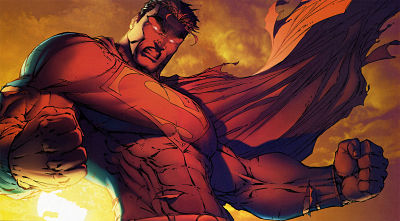 Okay now let’s get a little philosophical with this Superman character analysis and compare the character of Superman to the characteristics and lessons deemed from Nietzsche’s ‘Ubermensch’. Now if you haven’t heard of Nietzsche he’s pretty much this crazy philosopher who said a whole bunch of stuff about the meaning of existence and humanity and blah blah blah, stuff that people are still figuring out to this day what he meant. Ubermensch is one of the most famous things that he discussed. Its rough English translation is ‘Overman’ or ‘Superman’. Now obviously this whole Ubermensch concept came long before Superman was created, but what is discussed in his writings of the Overman can applied to the character of Superman.
Okay now let’s get a little philosophical with this Superman character analysis and compare the character of Superman to the characteristics and lessons deemed from Nietzsche’s ‘Ubermensch’. Now if you haven’t heard of Nietzsche he’s pretty much this crazy philosopher who said a whole bunch of stuff about the meaning of existence and humanity and blah blah blah, stuff that people are still figuring out to this day what he meant. Ubermensch is one of the most famous things that he discussed. Its rough English translation is ‘Overman’ or ‘Superman’. Now obviously this whole Ubermensch concept came long before Superman was created, but what is discussed in his writings of the Overman can applied to the character of Superman.
There is no definitive stance to what he really meant when he talked about Ubermensch but the basic idea is as follows:
- Ubermensch is an independent individual who has the power to not let external concepts such as law or religion completely define his moral standings
- The Ubermensch finds value in their life experience
- He is not a slave who seeks guidance from the masters of the world
- He is not a master who intends to force his views onto others and dominate them
- He is the master of self-discipline
 Sounds a little confusing I know. You would have to read all his work over and over again to get a real grasp about what he is trying to say about the Ubermensch, but that was about the basic gist of it. Ben Saunders describes the Ubermensch as “an independent individual who has the power to banish herd instincts from his mind and become a master of self-discipline”. In his work Nietzsche described the Ubermensch through a number of allegories, which ultimately in my eyes set out to tell the following:
Sounds a little confusing I know. You would have to read all his work over and over again to get a real grasp about what he is trying to say about the Ubermensch, but that was about the basic gist of it. Ben Saunders describes the Ubermensch as “an independent individual who has the power to banish herd instincts from his mind and become a master of self-discipline”. In his work Nietzsche described the Ubermensch through a number of allegories, which ultimately in my eyes set out to tell the following:
Pain cannot be avoided, and should be embraced
In Nietzsche’s work he talks a lot about pain. At the end of the day many of us won’t be able to avoid pain, so Nietzsche thought it was important for us to accept that pain is inevitable and embrace it. Easier said than done right? Basically he wants us to embrace pain because it is through a difficult experience that we become resilient and also learn to appreciate life more. Marilyn Monroe once said that “things go wrong so that you appreciate them when they’re right”. And really you learn to appreciate happiness a lot more after you have been through a lot of pain. And this is what Superman does. Superman has been through a lot of pain, and is constantly in pain. But he doesn’t allow that pain to overcome him.
The obvious source of his pain comes from the fact that he is ‘the last son of Krypton’, his birth family and their planet were completely destroyed, and that has always been a source of alienation for Clark. However growing up in a loving family with plenty of friends, that pain is alleviated a bit. But in reality Superman is in pain all the time. He is always hearing the pain of the millions of people on Earth crying out for help. He deals with that emotional burden all the time. He deals with the fact that even though it may seem like he has the power to save everybody, he can’t. A lot of the time people die because of his actions (as we saw in Man of Steel). You also have those stories where parts of society hate on Superman because they think he doesn’t have the right to decide who lives and who dies.
People riot when Superman doesn’t save their loved ones, but saves another. So he is forced to deal with that pain as well. It is very overwhelming and he can easily let that pain take over him, but he doesn’t. He accepts that pain and learns to become resilient to it, but doesn’t take it for granted either. That pain directs his actions and thoughts, so that the great implications of his being never become an oversight for him.
We cannot accept just any truth told to us by external authorities
Truth, justice and the American way right? Although that statement has changed over the years, truth is a big part of any Superman character analysis. In Nietzsche’s work he talks about us not being purely dictated by external authorities. That we shouldn’t blindly accept things told to us by other people and organisations. We need to find a balance. We should let the ideas of others inspire and influence us, but we should try to make other peoples’ ideas our own by understanding it for ourselves, and not just accepting it outright without truly understanding and investigating the notion. And this brings us to the notion of truth. Like the film Memento (one of my all-time favourite movies) explored, truth is very subjective. Because of the fallibility of human perception, it’s hard to discern what the absolute truth is.
That’s why we must question the ideas of others and not just blindly follow them, because one person’s idea of the truth may be different from yours depending on their world view. This is something that Clark Kent understands. In many of the older comics Clark Kent becomes a journalist because it allows him to hear what’s happening around the world quickly and allows him to be in places where people won’t question why he is there. In the newer comics that idea is still there, but he is also a journalist, because he loves it. He loves uncovering the truth, and investigating the perspectives of people who usually are ignored. Clark doesn’t just accept the truth told to him by other people, he investigates it and forms his own ideas. That is the idea of Nietzsche’s Ubermensch, to form your own ideas and values, not just accept the ideas of others blindly.
We have to possess courage and strength to truly do that
But in a world where there a billion different people and organisations telling you how to feel and think, it’s hard to think for yourself sometimes. And most of the time, it’s just easier to let other people think for you, because the alternative is terrifying. Nietzsche described the metamorphosis of the camel to the lion to the baby (and if you’ve watched 2001: A Space Odyssey then you can probably see how that film was heavily influenced by Nietzsche’s Ubermensch concept). Basically the metamorphosis is about transcending our current human limits, limits which include blindly walking through life. Superman is a lion. He possesses the courage and strength to pursue truth and freedom, and it of course comes at a cost. As I mentioned earlier, people don’t always agree with his ways.
For example in many comics the US government want to use Superman as their political pawn. They want to dictate what he should do and how he should do it, to help the American way. However Superman doesn’t blindly follow US orders. He investigates things himself and makes his own choices. Superman doesn’t just go around overthrowing dictators because the government tells him to. He looks at things from both perspectives to get a greater understanding of the truth. And that’s hard. He is looked down upon by some US officials because they don’t think he is doing enough to help them (Lois Lane’s dad General Lane for example, typically isn’t the biggest fan of Superman and his ways). Clark must have the courage and strength to use his own judgement to solve such moral dilemmas. And it’s that aspect that keeps him very grounded to humanity. We all do it, or aim to do it, use our own judgement to solve moral dilemmas, and in that respect he isn’t above us, in that respect he is no different from us normal folk.
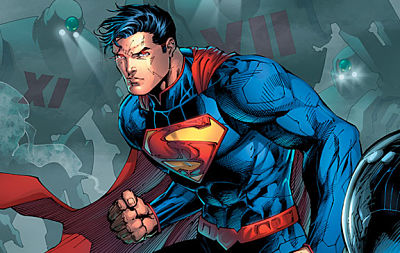 Now of course Superman and Ubermensch are still very different, as Ubermensch is ultimately the final step in human evolution, and Superman really isn’t there yet, and he shouldn’t be either. The Ubermensch is quite extreme, as it does not need external concepts of good or evil or law or religion, to base its values around. But as I said for Superman it’s not about completely ignoring those facets, but being inspired and influenced by them, but not influenced completely. Superman is about finding that balance. And because of that balance Superman finds, he becomes a source of inspiration and hope for us.
Now of course Superman and Ubermensch are still very different, as Ubermensch is ultimately the final step in human evolution, and Superman really isn’t there yet, and he shouldn’t be either. The Ubermensch is quite extreme, as it does not need external concepts of good or evil or law or religion, to base its values around. But as I said for Superman it’s not about completely ignoring those facets, but being inspired and influenced by them, but not influenced completely. Superman is about finding that balance. And because of that balance Superman finds, he becomes a source of inspiration and hope for us.
Thousands of words later that is my Superman character analysis. There are a lot of ways to view the character of Superman, but personally, this is how I view him, and this is why I love him so much. When it comes to his moral dilemmas and his growth as an individual, I do find him relatable. Others will still find that he is the least relatable hero, and that’s fine. Again it’s all subjective.
Anyways what do you think about Superman and this Superman character analysis? Find him fascinating or boring? Let me know!
If you like GirlonComicBookWorld and would like to support the site, you can head HERE to make a contribution, anything is appreciated!
Categories: comic book characters


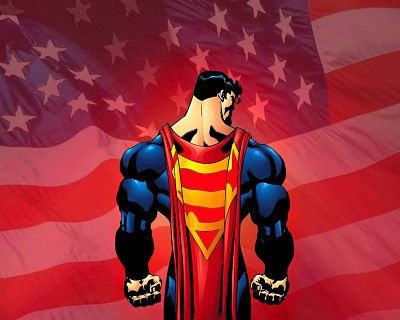
I love your summation of Nietzsche!
LikeLike
thanks!
LikeLiked by 1 person
Thanks for explaining the whole ÜBermensch thing….the term has been misused way too often.
I think my main problem with Superman is that he is too powerful, and his powers are often poorly defined (in the adaptations, perhaps the comics are more precise).
LikeLike
Yeah many people have different understandings about it.
Fair enough, that is a big problem with the character, that comes up a lot with discussions I have with people, his powers are so ambiguous it’s pretty stupid sometimes.
LikeLike
I always thought that the “He’s Too Powerful” complaint is just a result of lack of imagination on the part of the people writing him. All Star Superman is, in my opinion, one of the greatest Superman comics of the modern era, and Grant Morrison opened that with making Superman more powerful than ever.
Mark Waid’s Kingdom Come is another example of a story where Superman was explicitly stated as being even more powerful than he’s usually portrayed in current comics, and that was another great story. It can be done. It just requires imagination and creativity.
LikeLike
That’s completely true. All-Star and Kingdom Come are great examples. I think it is tricky though to write Superman when he is being portrayed as very very powerful, but it does offer an interesting perspective when presenting a story about a god and issues with humanity. When taken from the right approach you can really get great stories with a powerful Superman.
LikeLiked by 1 person
I love your essay. I like Superman too. it’s funny how people are like:
“Superman is boring. He’s too powerful.”
Later…
“Batman can totally beat anyone, lol. He can beat Superman without kryptonite. Batman can beat God.”
The same people that think that Superman is too powerful, also think Batman can beat anyone. Also, they forget Superman’s villain. Darkseid, General Zod, Faora, etc etc. All of them are powerful, in par with Superman.
LikeLike
Thanks! Hahah that’s so true, it’s okay for Batman to do anything and beat everyone but not Superman
And exactly his villains have the same or excel his level of power so it’s not likes it’s an easy fight
LikeLike
Great Analysis! He’s my favorite too.
LikeLike
Thanks, Superman is just great 🙂
LikeLike
Great post. Well said.
I love DC’s Trinity of Supes, Bats and Wonder Woman, and find them all inspiring.
I guess my flawed opinion on Superman vs Ubermensch is that I see Ubermensch as the possible evolution of humanity, at least as far as it can go while operating in a materialist paradigm that acknowledges no higher power. I see Superman as always helping/saving people because he can. The Ubermensch I see more as “help yourself”, rather than encouraging dependency on authority, religious or savior figures or super-heroes to save us from ourselves, or resolve the problems we have created and are ultimately responsible for.
I don’t see the Ubermensch as a nihilist, but perhaps close to a Zen way of life, a realist rather than a religionist. If every person were that, there were would be no looking for savior figures, not worship or anybody or anything as lesser of greater, as we would assume that as adult human beings, we are responsible for ourselves.
The Ubermensch could be the adult phase of the human species, rather than the child like phase of blaming others and expecting super heroes and savior figures to save us or fix everything for us, which only cheats us out of our own growth through experience.
I haven’t really gotten into Nietzsche’s works, but the context that comes to mind is that his writings came in era of moving away from blind faith and religious fanaticism into reason, logic and science. Not that those things went away, just that he was reacting to them, and his famous words of “God is dead” hinted not so much that God was dead, but the idea of not growing up as a species was not a valid survival option for the future.
LikeLiked by 1 person
Really well written and thought out. I love Superman too and it’s annoying when people just dismiss him as being a boring boy scout or regurgitate other misconceptions they heard about the character. You have a good understanding on what makes Superman great and expressed it very articulately. Well done!
LikeLike
Thanks so much for the read!
LikeLike
superman is the ultimate immigrant 🙂 As an immigrant my self his story is very inspiring 🙂 good write 🙂
LikeLike
Awesome to hear!
LikeLiked by 1 person
I think Superman is great.
LikeLike
Reblogged this on mcmahonsstory.
LikeLike
This is the closest thing I’ve found to actual psychoanalysis of the character. Most other sites dissect what the character means to us, but not what the character actually is. I’d still love to find some concrete psychological disorders that describe superman’s flaws.
LikeLiked by 1 person
I never understood the whole “Superman is boring because he’s a moral paragon” argument. Batman has been consistently portrayed as much more of a moral absolutist than Superman ever was for decades now. People have contrived all kinds of scenarios that would make Superman forsake his moral code (like the Injustice comic) while at the same time portraying Batman as a guy who wouldn’t shoot the Joker no matter how many more innocents died because of him.
He has too many vaguely defined powers? Batman has the exact same problem. His fortune is treated as a fount of infinite resources from which he can buy himself any superpower he wants. If he wants to fly, he buys a Bat-Jet. If he wants to shoot lasers from his eyes, he buys a Bat-Laser-Helmet. He wants to be super strong, he buys Bat-Gauntlets-Of-Fist-Fighting-Darkseid (this was a thing that happened in the comics).
LikeLiked by 1 person
Thank you for this well-written and easy to ready analysis of Superman. I’ve been rewatching some of the Christopher Reeve Superman movies the last few days and occasionally thru-out the day find myself trying to “figure out” how his personas work..or why this particular version Superman chooses to live this way. Superman and Clark are two totally different people in these movies..Clark is the mask in this one, but is such a well-crafted persona that he takes on a life of his own as well, making this version of Superman a character with a fragmented psyche. Which, that makes for an interesting character in itself as well! In Superman 3, the two personas battle each other..while one is the “evil” version, the battle is more than Good Superman vs. Bad Superman..it’s a struggle between these two personas..anyway..In searching for an analysis of Superman’s psychological state, I came across your article and enjoyed it. It gave me a lot to digest other than the psychological state of a movie character from the 70’s lol.
LikeLike